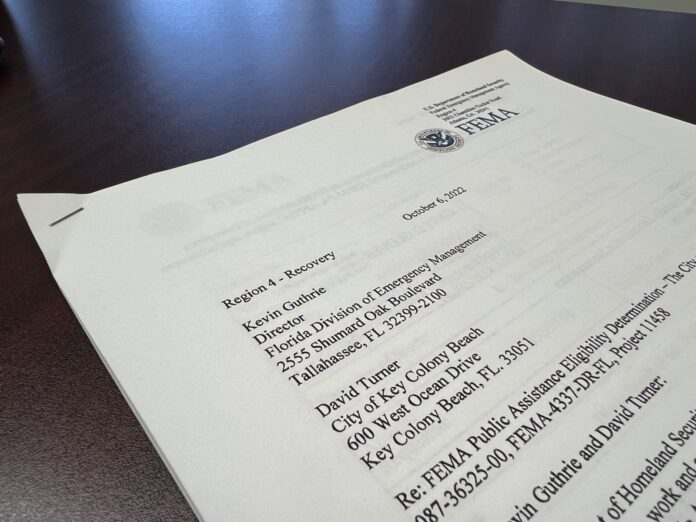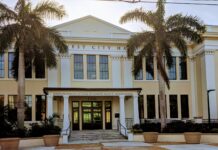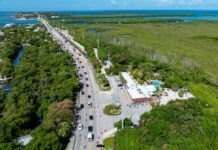
A recently-resurfaced FEMA letter discovered by Key Colony Beach City Attorney Dirk Smits may fan the flames for certain aspects of the island’s City Hall debate. But both the contents of the letter, and the timeline of its receipt and distribution, may pose more questions than it answers.
$3M Denial Letter Resurfaces
Dated Oct. 6, 2022, the letter, addressed to City Administrator Dave Turner and Florida Division of Emergency Management director Kevin Guthrie from FEMA infrastructure branch director Gary D. Glover, denies a $3.685-million request from KCB for a rebuild of its city hall due to damage from Hurricane Irma. Declaring that damages caused directly by the storm, excluding pre-existing conditions in the hall, do not qualify for a rebuild under the agency’s “50% rule” – that is, if disaster damages exceed 50% of the cost of restoring a facility to its pre-disaster condition – the letter instead approves total supported costs of $162,048 to repair the existing structure.
Several engineering reports examined by the Weekly over the last six months, from firms including the Institute for Building Technology and Safety, Peters Engineers and project delivery firm CSA Group, were prepared at various points from 2017 to 2019, and all provided varying estimates and professional opinions for the proper path to repair or replacement of the building.
Reports reviewed by the Weekly prior to the FEMA denial letter’s emergence had mostly presented findings that the building’s damages exceeded the 50% rule, and that when combined with space concerns for staff and other issues, including ADA compliance, replacement of the hall was the most viable path forward.
Virtually all reports now available at press time largely revolve around the floor in the administrative area of the old hall. Unlike the Marble Hall section of the existing building, which was used for commission meetings and community events even after the storm up until the summer of 2022, the administrative area lacks pin piles for support to prevent foundation settling.
Though few deny that the floor beneath the administrative section had begun to settle before Hurricane Irma, different engineering reports contain wide-ranging views on the degree to which the storm exacerbated the issue, forming the crux of FEMA’s denial argument.
In an April 2023 email, former KCB Building Official Ed Borysiewicz refuted claims in the Peters Engineers report, stating that settlement of the floor had been ongoing since he was hired in 1987. A supporting letter sent the same month from local contractor Ed Sims stated that he told the city commission in 2017 and 2018 that the building could be repaired within three months at an estimated cost of $300,000. Claims by former city clerk-turned commissioner Kathryn McCullough that former City Administrator Chris Moonis and/or then-Mayor John DeNeale instructed city staff to remove a portion of the settling floor to exaggerate storm damages formed the basis of a still-ongoing FEMA fraud investigation against the city.
FEMA’s denial letter, meanwhile, zeroes in on documentation provided by Eastern Engineering Group, a firm formerly contracted by KCB, which “advised that the required method of repair for the damaged facility is demolition in excess of 50 percent of the structure in order to install augercast concrete piles to a depth of 23 feet. It was also advised that construction equipment necessary to make the repair would be inhibitive to the existing 1960s foundation system.”
However, it continues, “in provided documentation, Eastern Engineering Group does not claim to have inspected the damaged city hall building or reviewed any other damage data or assessments. Eastern Engineering Group did not provide findings of damages or recommendations for repair of any damages from any cause.”
The letter also outlines the results of two other 2018 reports, referenced as “Keystone Revised Engineer Report” and “KCB Geotech Report,” original copies of which were later obtained by the Weekly.
Among other items, the Geotech report, prepared by Universal Engineering Services on Aug. 14, 2018 presents findings of “voids exist(ing) under portions of the slab,” occurring “likely … as a result of uncontrolled fill beneath the floor slabs over a long period of time.”
An investigation summary that opens the Keystone report, dated Aug. 3, 2018 and prepared by Keystone Experts + Engineers, states “the voids beneath the slab were an ongoing, long term condition caused by settlement of soils coupled with cyclic inundation of the soils.”
“The long-term condition of the voids indicated that the foundation was not in imminent danger of failure, and, subsequently the structure is not unfit for occupation,” it continues. “However, the voids below the floor will need to be eliminated to prevent the collapse of the concrete floor.”
Nailing Down a Timeline
With the subject of city hall’s repair versus replacement serving as KCB’s largest lightning rod of debate since Irma, with each side relying on a subset of existing engineers’ reports for support, it is still unclear how the denial letter stayed almost entirely out of the eye of the public and the city commission for the last 12 months.
In an interview on Nov. 28, Turner said he was surprised upon receipt of the denial letter, as an earlier email sent by FEMA associate Ronald Hovell on Nov. 16, 2021 had asked him to “sign” for the city hall replacement project – pending final reviews from FEMA and the state of Florida – at a net FEMA cost of $3,033,074. Though the denial letter outlined provisions for an appeal within 60 days, Turner confirmed the city had elected not to pursue this appeal.
When asked about the chain of possession for the letter upon receipt, Turner said he “was sure (the letter) was shared,” but couldn’t remember specifically how its contents were relayed, whether through individual discussions or through comments made at a commission meeting.
Though the letter is dated Oct. 6, 2022, Mayor Pro Tem Beth Ramsay-Vickrey and commissioners Joey Raspe and Freddie Foster all told the Weekly by phone that they hadn’t seen the document itself until October 2023. Commission meeting minutes reviewed by the Weekly from October, November and December 2022 make no mention of the letter.
“The letter clarified what I had heard in the couple months running up to the (2022) election, with (former commissioner) John (DeNeale) talking about not getting the FEMA money,” said Ramsay-Vickrey, further stating that Smits presented the letter to her on Oct. 11, the day former Mayor Patti Trefry resigned, and that it was addressed during the commission’s closed attorney-client session near the start of its Oct. 19 meeting. “I asked Dirk to distribute the letter (to other commissioners), and said that in the next closed session, this would be given and discussed with the commissioners so they understand what this letter is and what it means.”
Speaking with the Weekly by phone on Nov. 28, DeNeale said he had no recollection of the FEMA letter, received near the end of his term in November 2022.
Ramsay-Vickrey’s timeline was disputed in part by Foster and Raspe, who said they had been individually contacted by Smits a few days prior to the closed session to specifically address the letter’s discovery. Foster added that the closed session’s discussion revolved around the city’s pending lawsuit with resident Laurie Swanson over the award of a contract for a new city hall building, not the letter.
Raspe, who voted against the complete city hall rebuild earlier this year and made a strong push at the commission’s Nov. 16 meeting to reopen the Marble Hall portion of the building, said he was “just as dumbfounded” that the letter had not been discussed in the past year.
“I don’t know how it could have happened,” he said. “Why was it safe enough for the residents to occupy Marble Hall all the way up until July 2022? It was no less safe then than it is now.”
“I just want to make sure the residents know that there are members of the commission who are trying to get their building open for them,” he added, saying he intends to continue his pursuit of a safety inspection and reopening of Marble Hall.
“Let’s forget for a moment the whole City Hall project. Right now, today, people want to use this building, and they can’t. I think anything the city can do as a whole that will make things a better relationship with the residents right now is a step in the right direction.”
Additional phone calls by the Weekly to Smits and Trefry seeking further comment on the letter’s discovery and timeline had not been returned at press time.
What’s Next for City Hall?
Swanson’s challenge of the commission’s 3-2 decision to award construction of the new city hall to Hands On Builders LLC (HOB) at a bid price of $8.375 million remains in litigation. In the absence of a settlement, a preliminary scheduling order released Nov. 8 by Judge Mark Jones set a projected trial date of July 2024. In the case’s second court appearance, the central issue is whether the commission’s award should be viewed as a legislative action, subject to challenge by referendum petition per KCB’s code, or a discretionary budget expense, which does not appear to be subject to challenge.
If litigation persists through the summer, any potential city hall build will require a continued commitment from HOB. Key Colony Beach has yet to formally accept the contractor’s bid, valid for 120 days after its opening on June 5, 2023. Though this period officially ended Oct. 3, Turner told the Weekly that early – though informal – indications from HOB representatives in a Nov. 28 meeting were that the company would honor its bid beyond the originally agreed-upon window.
























